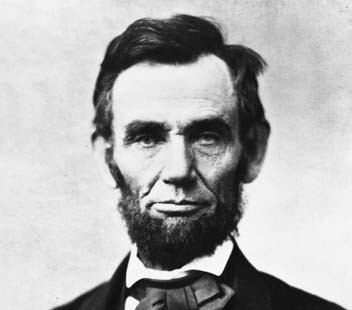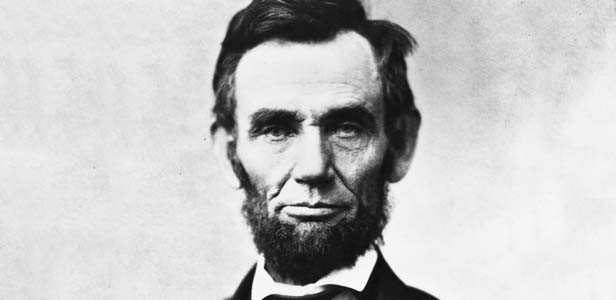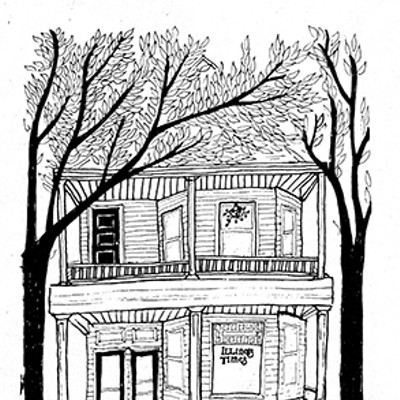This town has been the theater for the careers of many a self-made man and woman (and nearly as many unmade ones) but the self-taught person is rare among us. Not so a century and more ago. In Illinois’s glorious past, when men were men and women wished they lived in Ohio, schoolteachers were as scarce as phrenologists are today, and not much more sophisticated intellectually. The state’s seventh governor, Thomas Carlin, did not learn to read until he was out of childhood, and while his ignorance was an advantage when it came to winning votes in the Jacksonian era, it was a grave disadvantage when it came to running a state suffering growing pains.
Lincoln’s exploits as an eager learner — the reading by firelight, the treks to borrow books, the study sessions atop the store counter in New Salem — are part of his legend. Walking six miles to borrow a book is a minor feat to a young person with long legs and a love of reading; walking six miles to borrow Samuel Kirkham’s English Grammar — only a young man with a love of learning will do that.
If schools were not available to teach what was known in Lincoln’s day, in later days what was known was not available to the schools. The female social scientists who invented the field of sociology in Chicago at the turn of the last century had to teach themselves for the same reasons that famous British scientists in the 19th century, such as Michael Faraday and Alfred Russel Wallace, taught themselves, because so much of what is now thought of as the basic Western curriculum hadn’t been learned until they discovered it.
The easy access to schools (including our post-secondary institutions of further education) would seem to have made self-teaching unnecessary, just as the rise of credentialism has made it impractical. Yet today might be the golden age of self-directed learning. (I prefer the term “self-directed” to “self-taught,” since every autodidact has teachers. Lincoln’s included Shakespeare, Gibbon and Pope as well as the poets.)
Academic high flyers are impatient because schools don’t teach all the knowledge that exists (or, as is the case with many home schoolers, because they teach too much of it). Consider the resumés of the typical scholarship and science fair winners. These high school kids not only master what their school offers but undertake to augment it through independent study.
Curiosity, not curriculum, usually determines the direction of these explorations. Carl Butt, the 2009 Susan Cook House Student of the Year, National Merit Scholarship winner and Springfield High School valedictorian, has been interested in artificial intelligence since the sixth grade. Then (we read in the SJ-R) he encountered a robot at an engineering open house at the U of I’s Urbana-Champaign campus and began to wonder how it worked.
The Internet has put the good books that Lincoln walked across half a county to read on everyone’s desk. Of course, the Internet has also put on our desks books that Lincoln would have scorned. The young Lincoln read narrowly but deeply, and what he read was worth reading (just about the opposite of a typical student his age today). There is more nonsense than sense on the Web, and the millions of Americans who are the victims of state-directed learning find it hard to discriminate between them. The result is the pestiferous self-taught “expert” whose yammerings have confused public debate on a dozen important issues.
I remain in favor of self-directed learning nonetheless. Whatever it lacks in system, it gives one a chance to escape the propaganda of the committed professor and the pieties of the educationalists. Michael Burlingame, Lincoln’s Boswell, reminds us how Lincoln once corrected a young clergyman who insisted that people of force can get on pretty well without books. “They do their own thinking,” the minister said, “instead of adopting what other men think.” Lincoln agreed, but added that “books serve to show a man that those original thoughts of his aren’t very new, after all.”
At some point what other people think matters. Self-directed should not be confused with self-referential. One’s learning, however acquired, must be tested in the real world. To her embarrassment as an adult, Betty Friedan, a bookish kid during her childhood in Peoria, used big words she’d learned from books but mispronounced them because she’d never heard them said out loud. It is thanks to such moments that many autodidacts learn the truth of the old saw about clients who act as their own lawyer having a fool for client, and discover that they had an idiot for a pupil.
Contact James Krohe Jr. at [email protected].





















